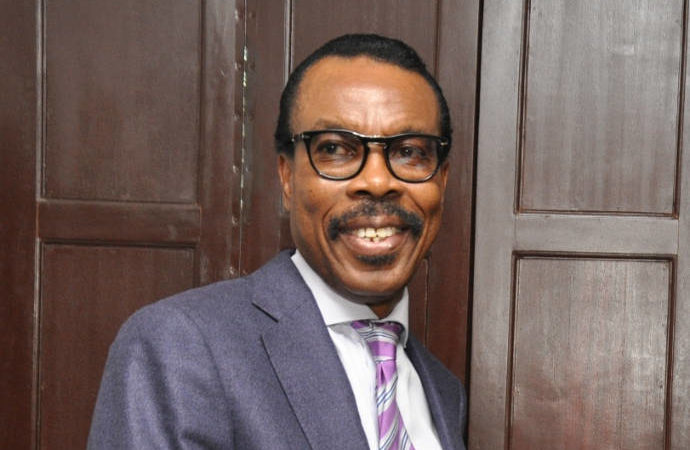This post has already been read 1820 times!
A member of Nigeria’s Economic Advisory Council (EAC) and Chief Executive, Financial Derivatives Limited, Mr. Bismarck Rewane, has said that to reduce the growing number of poor persons in Nigeria, the current $88 billion investment threshold must be increased to between $160 billion to $200 billion.
Speaking during a web conference tagged, “Strategies to Navigate the Oil and Gas Business Through the Global Pandemic,” witnessed by representatives from First Bank of Nigeria, Oando Energy Resources, Banwo and Ighodalo, Standard Chartered Bank PLC and others, Rewane stated that the low investment in the country’s economy was responsible for the nation’s high poverty rate.
According to him, Nigeria will continue to depend on oil revenues, noting that because of the impact of the COVID-19 pandemic, the federal government must begin to ‘nurture’ the proceeds from the oil sector to grow other areas of the economy.
The economist explained that with a meagre 14 per cent of total investment to the country’s Gross Domestic Product (GDP), there is no end in sight to the increasing number of severely impoverished Nigerians.
He said: “Nigeria will continue to depend on oil, but the question is why is oil contributing 10 per cent to GDP and 90 per cent to export and 76 per cent to revenue?
“The truth is that GDP is an output measure; therefore, the Nigerian government now is going to incentivise upstream, midstream and downstream . We need to nurture this goose (revenues from oil). So, we can use the proceeds of this nurturing to invest in other sectors. Investment as a percentage of GDP in Nigeria is only about 14 per cent.
“For you to have an investment multiplier that has an impact on poverty, people’s lives, growth and inequality, we need to take it from the current $88 billion to at least $160 to $200 billion. That is what will make an impact.”
Reeling out the grim economic indices occasioned by the ravaging COVID-19, Rewane said the managers of the Nigerian economy were in a dilemma because any decision taken to rev up some of the indices would negatively affect others.
“Nigeria already had a recessionary gap. What we are facing today is that we are going through a situation of stagflation, which is a recession plus an inflation. It is a very difficult situation to have both at the same time because if you lower interest rates you will push up inflation.
“If you keep interest rates tight, you kick people out of work. So, it’s a typical dilemma” he noted.
According to him, projected economic growth around the world will not only slow down, but be in the negative, adding that the efficiency with which companies and countries manage their situations will determine whether they will survive.
“Globally, what we have today is a situation where in 2019 global growth was projected at 2.9 per cent, now the projection is -three per cent, a contraction of about six per cent. For the US, it is about eight per cent. It is the largest economy in the whole world with a GDP of about $22 trillion.
“The US is contracting by eight per cent. China is going down from 6.1 per cent to about 1.2 per cent, a contraction of about five per cent . The EU was growing at 1.5 in 2019, but is now projected to grow at -7.5, so, it’s almost like that of the United States.
“For Sub-saharan Africa, we are going from 2.1 to 1.6. Now, no oil no Nigeria. It’s responsible for 10 per cent of GDP, 90 per cent of export and seven per cent of fiscal revenue. For Nigeria, GDP growth was 2.27 in 2019 and IMF says it will be -3.45, but we see it as -five, others are saying -eight. Whichever way you look at it, we are looking at a contraction of -six to –seven per cent in GDP growth for the entire economy.
“The balance of trade was $2.9 billion, it’s expected to be -$5 billion this year. Inflation was 11.39 last year, the high side was targeted at 19 per cent, but by June we think it should be at 15 per cent. The average exchange rate last year was N360, it’s trading at N430. But it is projected to come to N412 averagely in the first half of this year”, he explained.
He advised oil companies to raise their efficiency level so as to survive the current impact on their finances, adding that only then will they thrive.
“In Nigeria, there is a whole range of producers. Inefficient producers cannot survive, efficient producers will thrive in the situation. If your marginal revenue is higher than your marginal cost, you are under water,” he said.
As for the most impacted sectors, Rewane said: “Impact on aviation will be very negative, hospitality negative, for trading, 15 per cent of the Nigerian economy is trading and trading is affected by the exchange rate, oil and aviation.
“Impact on trading and outdoor activities will be high in the negative because there are no celebrations because of social distancing. Real estate is down. Transportation, will be medium, pension fund the same and health insurance.
“Sectors that will benefit from this situation are telecoms, ICT, e-commerce, electronic payment, mining and quarrying, healthcare, and pharmaceuticals,” he said.
“The High Commissioner said the Mission looks forward to working closely with the chief of staff on ‘our shared agenda in the challenging COVID-19 times,” the statement added.



